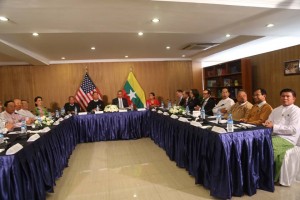
If amendments to the Burmese Constitution, the process for which is currently taking place in Hluttaw (Parliament), are developed following a federalist structure, granting equal rights to ethnic groups, it will increase the rate at which Burma’s current peace process will be accomplished, Amyotha Hluttaw Representative Dr. Banyar Aung Moe told President Obama at a recent meeting between the US President and Burmese political leaders.
“We, Hluttaw representatives, are working hard to amend the constitution to follow a federalist system, [in order to bring] democracy and peace to the nation. If the constitution grants ethnic groups full rights and equality, and matches with federal policy, the peace program that ethnic armed groups are working towards will be quickly accomplished. That is what I told the President [Barak Obama],” said Dr. Banyar Aung Moe, in an interview with IMNA.
During President Obama’s November 13th visit to Nay Pyi Taw for the 9th ASEAN Summit, the US President met with a number of political officials and representatives to discussed Burma’s current political situation, including Speaker of Pyithu Hluttaw (Lower House of Parliament) Thura U Shwe Mann, Speaker of the Amyotha Hluttaw (Upper House of Parliament) U Khin Aung Myint, opposition leader Daw Aung San Suu Kyi, and various Hluttaw representatives, including ethnic minority representatives.
Regarding his meeting with President Obama, Dr. Banyar Aung Moe stated that the US President acknowledged changes that had taken place in Burma during its democratic transition, while highlighting the importance of providing full rights and increased opportunities to ethnic groups.
According to Nai Hongsar, leader of the Nationwide Ceasefire Coordination Team (NCCT) and Vice-Chairman of the New Mon State Party (NMSP), the NCCT submitted a letter to President Obama stating that Burma’s ethnic armed groups are currently engaged in a national peace process, while identifying difficulties the armed groups are facing in negotiations with the Burmese government.
“After the Tatmadaw [Burmese military] has been in power for more than fifty years, it does not seem likely that it [the military] will give up its power. The 2008 Constitution also provides protection for its [the Tatmadaw’s] power. If the Tatmadaw does not accept [the negotiations], the Constitution will not be changed in any way,” Nai Hongsar told IMNA.
Nai Hongsar continued that President U Thein Sein agreed to engage in discussions and work toward accomplishing the NCCT’s proposal [to form a Union Army], and the Union Peace-Making Working Committee (UPWC)’s proposal [.],after the signing of a nationwide ceasefire agreement and subsequent political talks.
Although September’s 6th round peace talks between the UPWC and the NCCT failed to garner agreement on a number of points, both sides met for an informal meeting earlier this month in Nay Pyi Taw, at which point both sides agreed to engage in another round of talks by the end of this month.
During his stay in Nay Pyi Taw on November 13th, US President Barak Obama announced that in order to be able to better support Burma’s democratic transition, the US will be introducing a Peace Corps program in Burma beginning in 2015.
